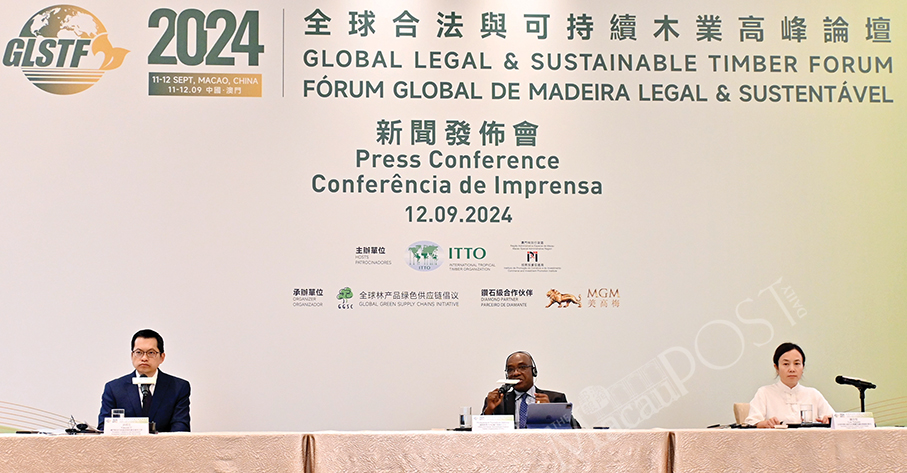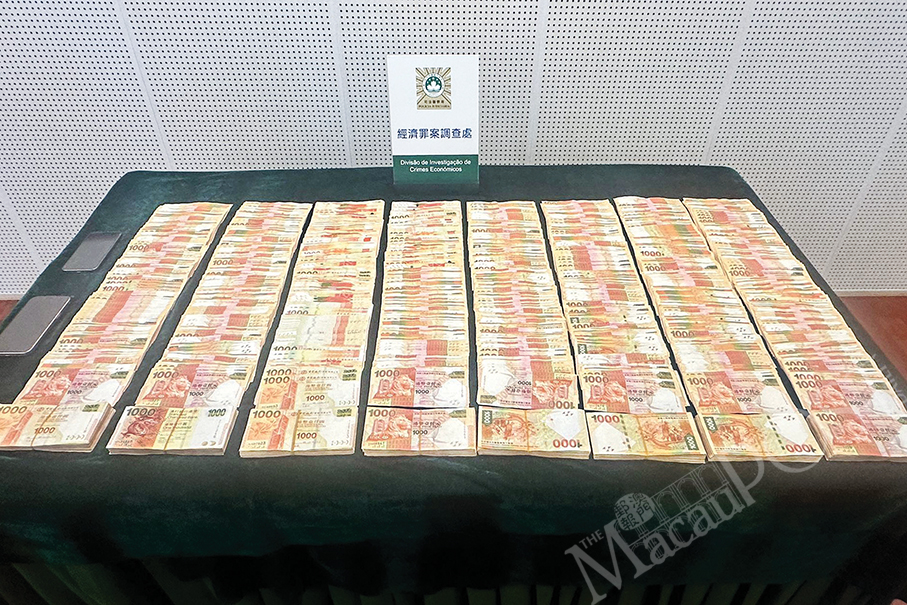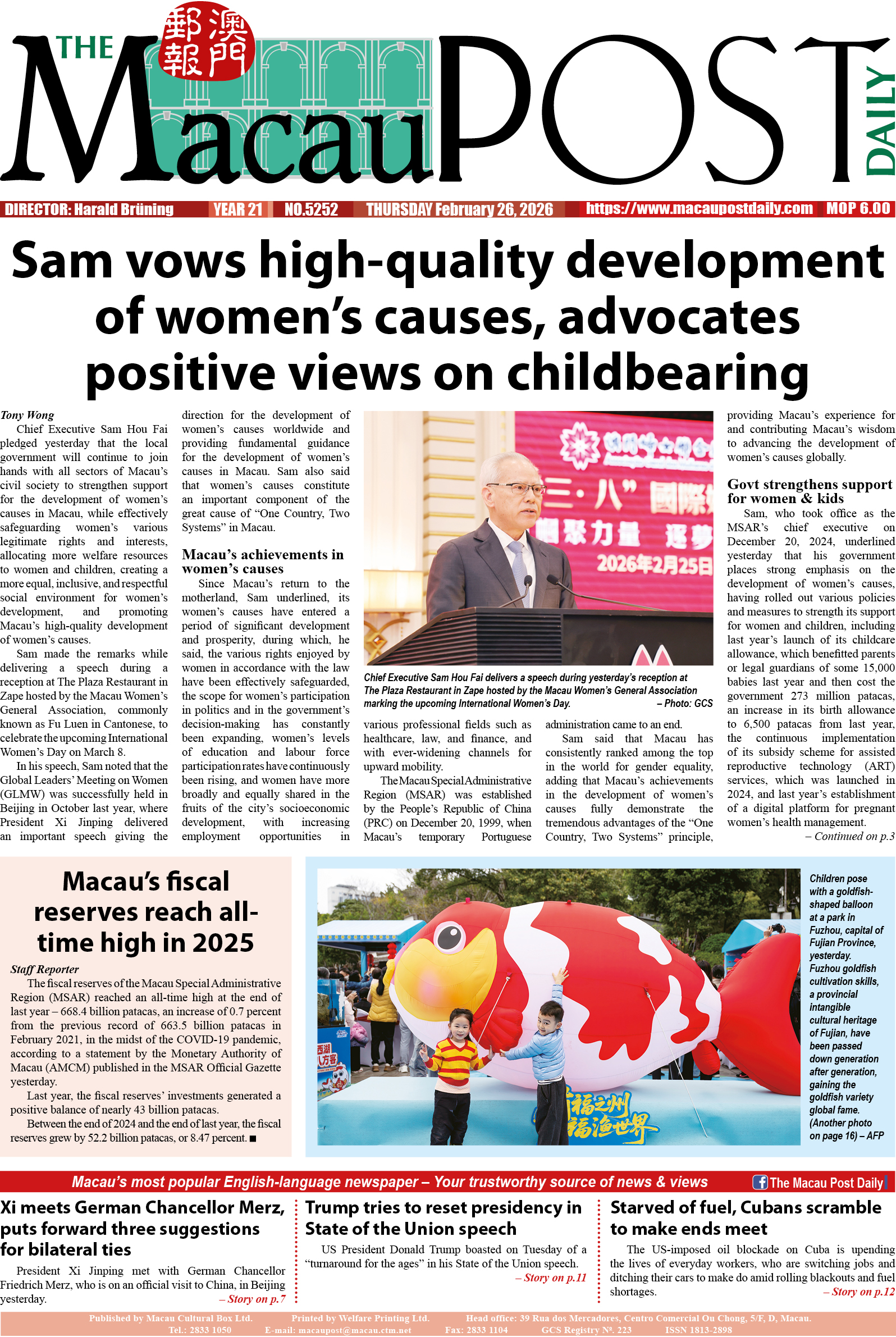Macau has not recorded any COVID-19 fatalities for 10 days in a row, from February 3-12, according to a statement by the Novel Coronavirus Response and Coordination Centre yesterday, which announced that no fatalities were recorded on Sunday.
Consequently, Macau’s official COVID-19 death toll has remained unchanged at 121.
No new COVID-19 patients admitted over weekend
No new patients diagnosed with the novel coronavirus disease were admitted to the Health Bureau’s (SSM) isolation and treatment facilities over the weekend either, yesterday’s statement said.
Macau’s first six COVID-19 fatalities were reported during Macau’s previous COVID-19 outbreak that began on June 18 last year and started to subside in late July, colloquially known as 618 outbreak in Cantonese. The Macau government was pursuing a dynamic zero-COVID approach when the city was hit by the 618 outbreak.
Macau’s seventh COVID-19 fatality was reported on December 13, a few days after the Macau government abandoned its long-running dynamic zero-COVID approach.
The 10 consecutive days without any COVID-19 fatalities is the longest period in a row without any deaths caused by the novel coronavirus, since Macau’s seventh COVID-19 fatality was reported on December 13.
Before one fatality was reported on February 2, Macau had not recorded any COVID-19 fatalities for seven consecutive days, from January 26 to February 1.
Macau suffered its first peak of widespread COVID-19 infections around the Christmas holiday resulting from the local government’s decision to abandon its dynamic zero-COVID approach on December 8, but the city’s COVID-19 situation has markedly improved since around the middle of last month. Nevertheless, for the time being the Macau Health Bureau is still urging everyone in Macau to continue wearing a facemask when they are in public places.
According to the Health Bureau’s COVID-19 website, as of Sunday Macau’s official cumulative number of confirmed COVID-19 cases stood at 3,507, of which 3,375 had meanwhile been cured.
Health Bureau Director Alvis Lo Iek Long told lawmakers last week that “there is no doubt” that the administration of a fifth COVID-19 jab will be needed in Macau.
Lo said last week that the Health Bureau was collecting and studying the latest research findings and COVID-19 vaccination practices in various places worldwide, such as the required interval between the fourth and fifth dose.
Secretary for Social Affairs and Culture Elsie Ao Ieong U told legislators last week that data collected during Macau’s widespread COVID-19 infections, which occurred from December to around the middle of last month, indicated that the administration of a fourth COVID-19 jab is able to significantly raise the level of protection that prevents senior citizens aged 60 or over from dying from the novel coronavirus disease.
Lo added that the data collected indicated that unvaccinated senior citizens will run the risk of dying from the novel coronavirus disease 18 times more than their peers who have received four COVID-19 jabs.
Each NAT costs 150 patacas
Currently, only individual-sample tests are available in the city’s fee-based COVID-19 nucleic acid testing (NAT) services provided by private testing institutions, because of which each nucleic acid test costs 150 patacas.
In an individual-sample test, a testee’s swab will not be mixed with other testees’ swabs.
When the local government was still pursuing a dynamic zero-COVID approach, Macau’s regular COVID-19 NAT programme, which was jointly run by a number of private testing institutions, adopted a 10-in-1 mixed testing approach, where 10 swabs were mixed in a batch of pooled samples, in normal circumstances. However, in special circumstances testees were still required to undergo an individual-sample test.
The 10-in-1 mixed sampling technique enabled laboratories to come up with results in a much shorter time. However, when a batch of pooled samples tested positive, the 10 respective testees were then required to have their swabs taken again – in which case their swabs were not mixed – in order for laboratory technicians to identify which of them had tested positive for COVID-19.
When Macau adopted a 10-in-1 mixed testing approach, each COVID-19 nucleic acid test cost only 45 patacas – i.e., for people in general who were allowed to undergo a mixed-sample test, However, a testee who was required to undergo an individual-sample test had to pay 150 patacas for each test.
When a place is hit by widespread COVID-19 infections after abandoning a dynamic zero-COVID model, according to medical sources, a mixed nucleic acid testing approach becomes impractical in terms of cost and time effectiveness, because a batch of pooled samples is much more likely to have a positive result.
Macau’s availability of only individual-sample tests began on January 8, when the COVID-19 NAT requirement for those travelling between Macau and the mainland was scrapped.
Since January 8, those departing for Macau from Hong Kong or Taiwan have no longer been required to display any COVID-19 test result either.
Currently, arrivals from foreign countries are still required to display a 48-hour negative NAT or rapid antigen test (RAT) result when embarking on their trip to Macau.
The Macau government has said that a number of NAT sampling stations still need to stay open in the city because residents intending to travel to certain foreign countries are still required to display a negative NAT result.
Currently, according to the Health Bureau’s NAT booking system, only seven NAT sampling stations for a fee-based test are still operating in the city, comprising three run by Kuok Kim (Macau) Hygiene Examination Company Limited, two run by Guangdong Nam Yue Group, and two run by Pureza Medical and Health Technology. Only individual-sample tests are available in the seven NAT sampling stations.
Two of the seven stations are located in casino-hotel resorts, namely Grand Lisboa in the city centre, and Venetian in Cotai.
Locals and tourists walk in Largo do Senado, the city’s main square, on Sunday. – Photo: Tony Wong









